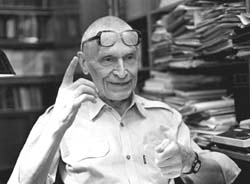Mykola AMOSOV, “I know that death causes no fear. The fear comes when intellect fades away”

On the evening of December 12, Mykola Amosov, undoubtedly one of Ukraine’s most illustrious people, came to the end of his life’s journey. The stroke that occurred earlier this year and the aortal valve dysfunction prevented the great surgeon, the winner of many international prizes, the Meritorious Scientist of Ukraine, and just a genial individual from celebrating his ninetieth birthday next year.
Words fail to describe Mykola Amosov’s greatness and significance for Ukraine and the worldwide medicine. He was an epoch- making personality, a showpiece of intellect and professionalism. In the times of the System, he was one of the few who managed to retain their own self. “In all probability, there was not, is not, and will never be a doctor more unselfish than Mykola Amosov,” says his colleague and friend Professor Isaac Trachtenberg. “Throughout his lifetime, he operated on more than 50,000 patients and never allowed himself to take even a modest gift. He even put up a notice at his clinic’s entrance: “No gifts accepted from patients.” He considered it true happiness to save a human life. “Yes, I am a happy man,” he sometimes said to his friends. Yet, many of his subordinates did not think so. They were just unaware that the stern mask disguised a sincere, kind, vulnerable, and extremely disinterested individual.
Mykola Amosov was not afraid of disclosing his mistakes. His friends and colleagues knew that he felt very oppressed when an operation failed and a life ended. Amosov experienced a psychological crisis in the 80s, when many patients were dying. He then announced he was dropping surgery for the whole summer and going to take up cybernetics alone. In the last years of his life, he still blamed himself for the death of two girls: they were killed by an explosion in the experimental hyberbaric oxygen therapy chamber. In all probability, a spark in the oxygen medium set off the blast. Amosov laid the blame on himself, not on the factory that filled the chamber with oxygen at a pressure below 2 atmospheres.
Not long ago, some of the colleagues would exchange good- natured banters with him: M. Amosov, in his 80s, decided he must lead an active way of life to be in good shape. Thus emerged the famous formula of three thousand motions. He persistently followed this pattern: a two-hour dumbbells-aided exercise and an hour of jogging every day. Also skeptical about this experiment to ward off aging was his savior, as Amosov called German Professor Koerfer who implanted him an artificial bio-valve and twice performed coronary artery bypass surgery. Prof. Koerfer did not prohibit the exercises; moreover, he promised to perform surgery again - at any age - if the valve failed. “If there is no willpower, there is nothing,” Amosov said and continued to jog, do exercises and, of course, write every day.
Although there is no prophet in one’s own country, M. Amosov’s social forecasts did and do come true. That he steered national medicine in the right direction raises nobody’s doubts. Apart from developing new methods of surgery and being the first in the world to devise anti-thrombotic artificial heart valves, Amosov proved the advantage of preventive medicine and the important role of the psychic component in somatic diseases. He devoted all his lifetime to struggling for somebody else’s, not his, life. “If I had to start from scratch,” Amosov used to say, “I would choose the same, i.e., surgery, plus reflecting on the eternal questions of humankind.”
In the last years of his life he tried to uncover the secret of retaining willpower, memory, intellect, and peace of mind. There were some impulses to change benchmarks, abandon realism, and take to religion, mysticism, and the now fashionable meditation. But he knew better. “I am going to stick to my position,” Mykola Amosov said. He kept his promise. He observed the world from all angles. Forecasting the future, he found no place for panic. “I know that death causes no fear. The fear comes when intellect fades away. What’s the use of living then?”
Den/The Day staff express sincere condolences to Mykola Amosov’s kith and kin, for we also consider his death as our personal bereavement. Mykola Amosov’s life, his ideas, intellect, uncompromising and firm defense of his persuasions have always served us as a goal, example to follow, and, if you like, an ideal (not always attainable, alas). Being keenly aware of this painful loss, we are still convinced that M. Amosov’s ideas will disregard all time limits and be a lodestar for more than one generation to come.
We mourn together with you.






